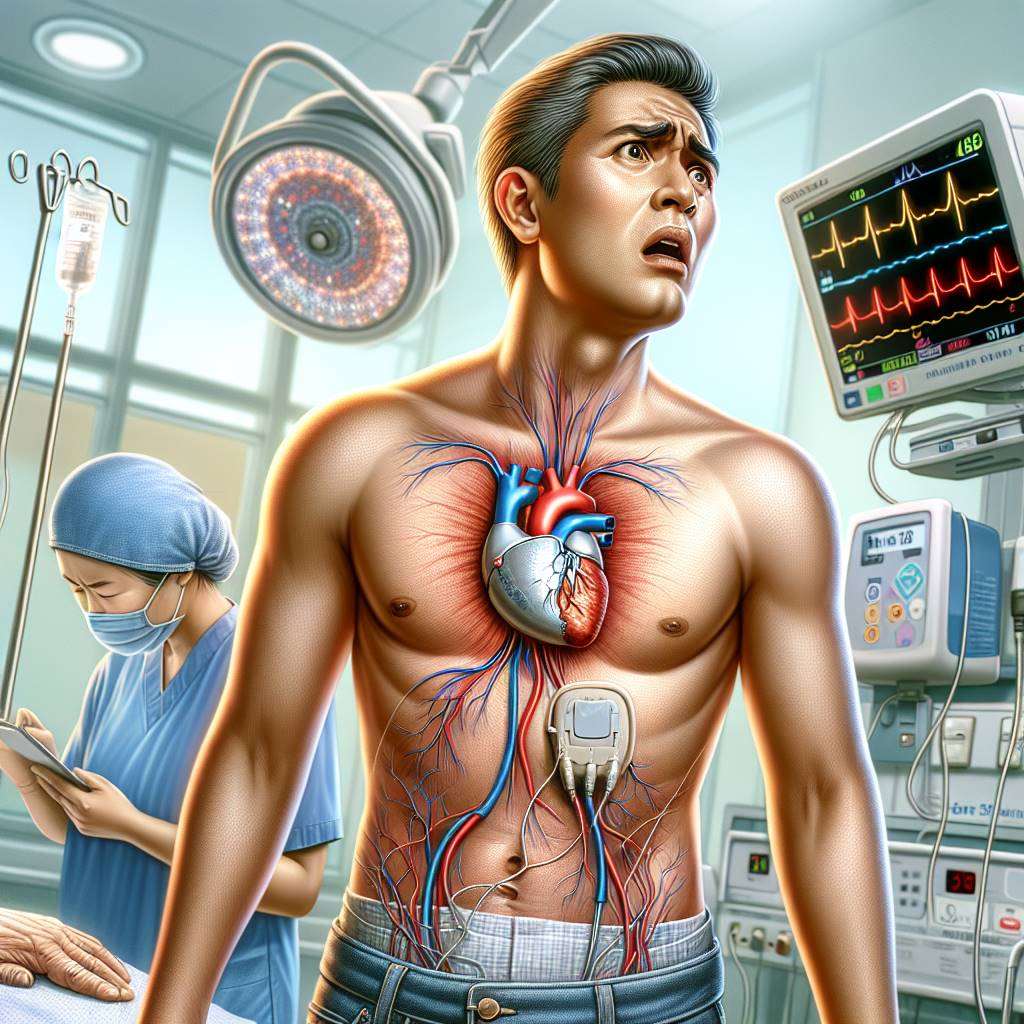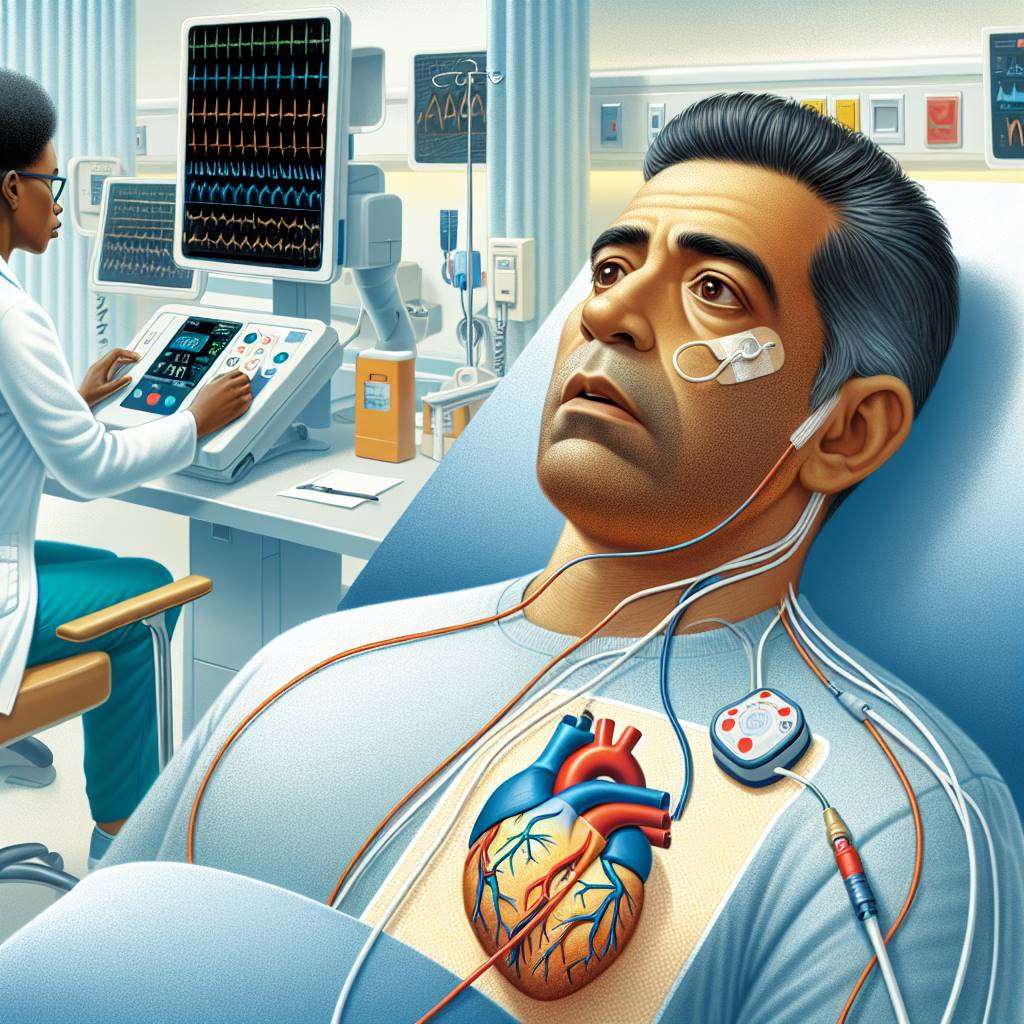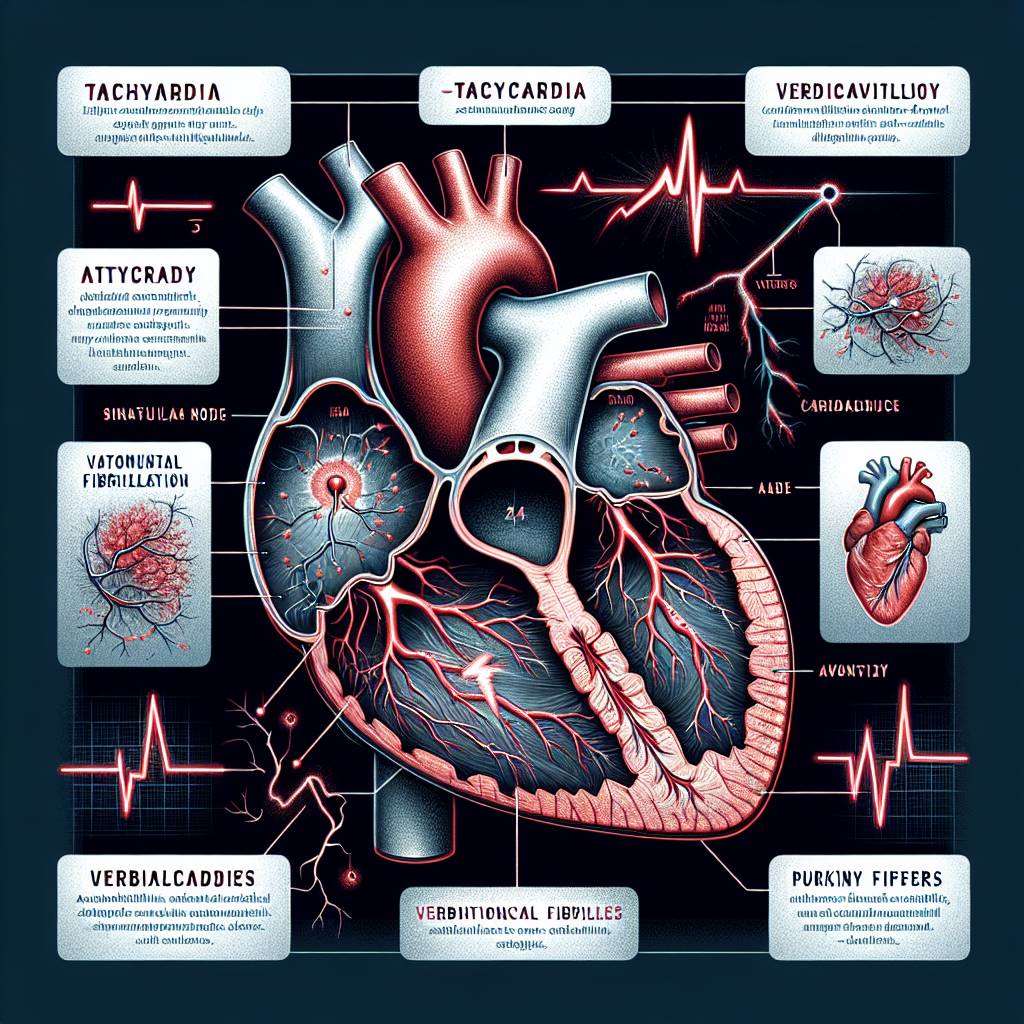An Automatic Implantable Cardioverter Defibrillator (AICD) is a life-saving device designed to monitor and correct abnormal heart rhythms. When it detects a dangerous arrhythmia, it delivers a shock to restore normal rhythm. Patients often wonder, "What does an AICD shock feel like?" Understanding this experience is crucial for those living with the device and their caregivers.
Medical disclaimer: This content is for general awareness and does not replace a doctor’s consultation. For diagnosis or treatment decisions, consult a qualified specialist.
The sensation of an AICD shock can vary widely, but it is often described as sudden and intense. Knowing what to expect can help patients manage anxiety and prepare for the possibility of a shock. This article explores patient experiences, the physical sensations involved, and how to cope with the effects of an AICD shock.
What Does an AICD Shock Feel Like?
An AICD shock is often described as a sudden, jarring sensation that can feel like being kicked in the chest. The intensity of the shock depends on the energy level delivered by the device, which is calibrated to correct life-threatening arrhythmias. While the shock is brief, it can leave patients feeling startled or disoriented.
Some patients report that the shock feels like a strong thud or a quick, sharp pain. Others describe it as a more intense, electrical jolt. The experience can vary based on individual pain tolerance and the specific condition being treated. Understanding these sensations can help patients feel more prepared and less anxious about living with an AICD.

Understanding the Sensation of an AICD Shock
The sensation of an AICD shock is designed to be effective in stopping dangerous heart rhythms, but it can also be uncomfortable. The device delivers a high-energy pulse to reset the heart's rhythm, which can feel like a sudden impact or a strong electrical surge. This sensation is a critical part of the device's function to prevent cardiac arrest.
Patients often describe the shock as startling, and it may cause temporary discomfort in the chest or upper body. Some individuals experience a brief period of dizziness or lightheadedness immediately after the shock. While the sensation can be alarming, it is a sign that the device is working as intended to protect the patient from life-threatening arrhythmias.
Real Patient Stories: Experiencing AICD Shocks
Hearing real-life experiences from patients who have received AICD shocks can provide valuable insights and reassurance. Many patients describe their first shock as unexpected and intense, but they also emphasize the importance of the device in saving their lives. These stories highlight the emotional and physical aspects of living with an AICD.
For example, one patient shared that the shock felt like "a quick punch to the chest," followed by a sense of relief as their heart rhythm returned to normal. Another patient described feeling anxious before their first shock but found comfort in knowing the device was protecting them. These accounts underscore the importance of patient education and support.
- Some patients feel a brief, sharp pain during the shock.
- Others report a sensation similar to a strong muscle spasm.
- Emotional reactions, such as fear or relief, are common.
How Painful Are AICD Shocks for Patients?
The level of pain experienced during an AICD shock varies from person to person. While some patients describe the shock as mildly uncomfortable, others find it more painful. The sensation is often compared to a sudden jolt or a strong thump in the chest. Despite the discomfort, the shock is a critical intervention to prevent potentially fatal arrhythmias.
It is important to note that the pain is usually brief, lasting only a fraction of a second. For many patients, the psychological impact of anticipating a shock can be more challenging than the physical sensation itself. Healthcare providers can help patients manage these concerns through counseling and education about the device's function.
First-Time AICD Shock: What to Expect
Experiencing an AICD shock for the first time can be a daunting experience. Patients often feel a mix of fear and uncertainty about what the shock will feel like and how it will affect them. Understanding what to expect can help alleviate some of this anxiety.
During the first shock, patients may feel a sudden, intense jolt that lasts for a split second. This is often followed by a brief period of disorientation or lightheadedness. It is important to remain calm and remember that the device is working to protect your heart. If you experience multiple shocks or feel unwell afterward, contact your healthcare provider immediately.
Preparing for the possibility of a shock can include discussing your concerns with your doctor, joining a support group, or learning relaxation techniques to manage anxiety. These steps can help you feel more confident and in control as you adjust to life with an AICD.
Do All AICD Shocks Feel the Same?
An Automatic Implantable Cardioverter Defibrillator (AICD) delivers shocks to correct irregular heart rhythms, but not all shocks feel the same. The sensation can vary based on the intensity of the shock, the patient's health condition, and the type of arrhythmia being treated. Some patients describe the shock as a sudden, sharp jolt, similar to being kicked in the chest, while others feel a milder thump.
The variability in sensation is influenced by factors like the voltage of the shock and the patient's pain threshold. Additionally, the emotional state of the patient, such as anxiety or fear, can amplify the perceived intensity of the shock. Understanding these differences can help patients prepare for and manage their experiences better.

Physical and Emotional Impact of AICD Shocks
The physical impact of an AICD shock can be startling. Many patients report a sudden, intense jolt that may cause temporary discomfort or soreness in the chest. In some cases, the shock can lead to muscle spasms or a brief loss of balance. While the physical effects are usually short-lived, they can be distressing.
Emotionally, AICD shocks can trigger feelings of fear, anxiety, or even depression. Patients often worry about when the next shock might occur, which can affect their overall quality of life. It's important to address these concerns with a healthcare provider to ensure proper emotional support and counseling.
- Physical effects: chest pain, muscle spasms, or fatigue.
- Emotional effects: anxiety, fear, or depression.
- Long-term impact: reduced confidence in daily activities.
Why Do AICD Shocks Feel So Intense?
The intensity of an AICD shock is due to the high-energy electrical pulse delivered to the heart. This pulse is designed to reset the heart's rhythm during a life-threatening arrhythmia, such as ventricular fibrillation or ventricular tachycardia. The energy released is necessary to interrupt the abnormal rhythm and restore a normal heartbeat.
Additionally, the shock is delivered directly to the heart muscle, which is why it feels so strong. The sensation can also be amplified by the element of surprise, as patients often do not expect the shock. While the intensity may feel alarming, it is a critical intervention that can save lives during cardiac emergencies.
How to Cope with AICD Shock Experiences
Coping with AICD shocks involves both physical and emotional strategies. Patients are encouraged to stay calm and focus on their breathing immediately after a shock. This can help reduce panic and allow the body to recover more quickly. Consulting with a healthcare provider about medications or adjustments to the AICD settings can also help minimize unnecessary shocks.
Emotional support is equally important. Joining a support group or speaking with a counselor can help patients process their experiences and reduce anxiety. Regular follow-ups with a cardiologist ensure that the device is functioning optimally and provide an opportunity to address any concerns.
- Practice relaxation techniques like deep breathing.
- Seek professional counseling or join a support group.
- Maintain regular follow-ups with your cardiologist.
Are AICD Shocks Dangerous or Just Uncomfortable?
For most patients, AICD shocks are not dangerous but can be uncomfortable. The primary purpose of the shock is to correct life-threatening arrhythmias, making it a critical intervention. However, repeated shocks, known as electrical storm, can strain the heart and may require immediate medical attention.
While the discomfort from a single shock is temporary, frequent shocks can lead to emotional distress and physical fatigue. It's essential to monitor the frequency of shocks and consult a healthcare provider if they occur often. Proper device programming and medication adjustments can help reduce unnecessary shocks and improve patient comfort.
| Aspect |
Impact |
| Single Shock |
Uncomfortable but not harmful. |
| Repeated Shocks |
May indicate a serious condition; requires medical attention. |
What Triggers an AICD Shock in the Body?
An Automatic Implantable Cardioverter Defibrillator (AICD) delivers a shock when it detects abnormal heart rhythms, such as ventricular tachycardia or ventricular fibrillation. These conditions can be life-threatening and require immediate correction to restore a normal heartbeat.
Triggers for an AICD shock include rapid or irregular heartbeats, which the device identifies through its sensors. Factors like stress, physical exertion, or underlying cardiac conditions may increase the likelihood of these arrhythmias. In some cases, false alarms can also lead to unnecessary shocks.
Understanding what activates an AICD can help patients manage their lifestyle and reduce potential triggers. Regular follow-ups with a cardiologist are crucial to ensure the device functions optimally.

How Patients Describe AICD Shocks in Their Words
Patients often describe an AICD shock as a sudden, intense jolt or thump in the chest. Some compare it to being kicked by a horse, while others feel a sharp, electric-like sensation. The experience can be startling, even if the shock lasts only a fraction of a second.
Emotional responses vary widely. While some patients feel relieved knowing the device is protecting them, others may experience fear or anxiety after a shock. The intensity of the sensation depends on the individual and the strength of the shock delivered by the device.
Sharing experiences with support groups or healthcare providers can help patients better understand and cope with these sensations. Open communication is key to addressing concerns about the device's function and impact.
Can You Predict When an AICD Shock Will Happen?
Predicting an AICD shock can be challenging, as it depends on the occurrence of abnormal heart rhythms. However, certain signs may indicate an impending shock, such as palpitations, dizziness, or chest discomfort. Recognizing these symptoms can help patients prepare mentally.
It’s important to note that not all shocks are preceded by symptoms. Some may occur suddenly without warning. Regular monitoring of heart health and avoiding known triggers, such as excessive caffeine or stress, can reduce the likelihood of shocks.
- Maintain a healthy lifestyle to minimize arrhythmias.
- Follow your cardiologist’s advice on medications and activity levels.
- Use wearable devices to track heart rate and rhythm.
While prediction isn’t always possible, staying informed and proactive can help patients feel more in control.
Managing Anxiety About Future AICD Shocks
Many patients with an AICD experience anxiety about potential shocks. This is a common concern, as the unpredictability of shocks can feel overwhelming. However, there are strategies to help manage this anxiety effectively.
Engaging in relaxation techniques, such as deep breathing, meditation, or yoga, can help reduce stress levels. Counseling or therapy may also be beneficial, especially for those experiencing persistent fear or post-shock trauma.
Discussing concerns with a healthcare provider is essential. They can adjust the device settings or recommend medications to reduce the frequency of shocks. Support groups also provide a platform to share experiences and learn coping mechanisms from others.
By addressing anxiety proactively, patients can improve their quality of life and feel more confident in managing their condition.
Tips for Living Comfortably with an AICD Device
Living with an AICD requires adjustments, but many patients lead fulfilling lives with the right strategies. Here are some tips to ensure comfort and safety:
- Avoid activities that may cause direct impact to the chest area.
- Inform healthcare providers about your AICD before undergoing medical procedures.
- Stay away from strong electromagnetic fields, such as those from MRI machines or industrial equipment.
- Follow a heart-healthy diet and exercise routine as recommended by your doctor.
Regular check-ups are crucial to ensure the device is functioning correctly. Carrying an AICD identification card can also be helpful in emergencies. With these precautions, patients can maintain an active and comfortable lifestyle.
Best Aicd Implantation Doctors in India
Dr. Balbir Singh, a renowned cardiologist with over 30 years of experience, is affiliated with Medanta - The Medicity, Gurugram. He specializes in electrophysiology and cardiac device implantation. Another expert is Dr. Praveen Chandra, Chairman of Interventional Cardiology at Medanta - The Medicity, with 28+ years of experience in advanced cardiac care. Both doctors are internationally recognized for their expertise.
Learn more on best aicd implantation doctors in india
Best Aicd Implantation Hospitals in India
Fortis Escorts Heart Institute, New Delhi, a NABH and JCI-accredited hospital, is a leader in cardiac care with advanced electrophysiology labs and international patient services. Medanta - The Medicity, Gurugram, also NABH and JCI-accredited, offers multidisciplinary cardiac care and cutting-edge technologies like robotic surgery. Both hospitals have a proven track record of successful AICD procedures.
Find more best aicd implantation hospitals in india
Aicd Implantation Cost in India
The cost of AICD implantation in India typically ranges from INR 5,00,000 to INR 10,00,000 (approximately USD 6,000 to USD 12,000). Factors like the type of device, hospital category, and doctor’s expertise influence the cost. The average hospital stay is 2–4 days. India offers a significant cost advantage compared to Western countries, with medical insurance and third-party financing options available.
Learn aicd implantation cost in india
Aicd Implantation Treatment in India
AICD implantation in India involves placing the device under the skin near the chest, with leads connected to the heart. The procedure is performed under local anesthesia and guided by fluoroscopy. Advanced technologies like 3D mapping and robotic assistance are used in top hospitals. Recovery typically takes 1–2 weeks. Indian hospitals adhere to global medical protocols, ensuring high standards of care.
Learn on Aicd Implantation Treatment in India
FAQs
What does an AICD shock feel like?
An AICD shock is often described as a sudden, strong jolt or thump in the chest. Some patients compare it to being kicked by a horse. While it can be startling, the shock is lifesaving as it restores normal heart rhythm.
Is an AICD shock painful?
For most patients, an AICD shock is uncomfortable but not severely painful. The sensation is brief and subsides quickly. Pain levels may vary depending on individual sensitivity.
How often do AICDs deliver shocks?
The frequency of shocks depends on the patient’s heart condition. Some may never experience a shock, while others might receive them occasionally if abnormal rhythms occur.
Can AICD shocks be prevented?
Preventing AICD shocks involves managing underlying heart conditions, adhering to prescribed medications, and avoiding triggers like excessive caffeine or stress.
What should I do after an AICD shock?
After an AICD shock, remain calm and rest. If you experience multiple shocks or feel unwell, seek immediate medical attention to evaluate the device and your heart condition.
Are there risks associated with AICD shocks?
While AICD shocks are generally safe, repeated shocks may indicate a problem with the device or worsening heart condition. Regular follow-ups with your doctor are essential.
Can I live a normal life with an AICD?
Yes, most patients with an AICD can lead normal lives. It is important to follow your doctor’s advice, avoid certain activities, and attend regular check-ups.
Are AICD shocks dangerous?
AICD shocks are not dangerous; they are designed to save lives by correcting life-threatening arrhythmias. However, frequent shocks require medical evaluation.
How long does an AICD battery last?
The battery of an AICD typically lasts 5–10 years, depending on usage. Regular device checks will help monitor battery life and plan for replacement.
Can I travel with an AICD?
Yes, patients with an AICD can travel. Carry your device identification card, avoid strong magnets, and inform airport security about your device.
Understanding AICDs: Functionality and Athletic Considerations
An Automatic Implantable Cardioverter Defibrillator (AICD) is a crucial device for individuals at risk of life-threatening arrhythmias. It continuously monitors heart rhythms and delivers shocks when necessary to restore normal function. For those new to this technology, our comprehensive guide, What Is an AICD and How Does It Work? A Beginner's Guide, provides essential insights into its operation and benefits.
For athletes with AICDs, understanding exercise limitations is vital. Many wonder if their condition restricts their ability to engage in sports. The blog Do Athletes with AICDs Face Restrictions? Exercise Guidelines Explained outlines the specific guidelines and considerations for maintaining an active lifestyle while ensuring safety.
In conclusion, both the functionality of AICDs and the exercise guidelines for athletes are critical for informed health decisions. By understanding these aspects, individuals can lead healthier, more active lives.